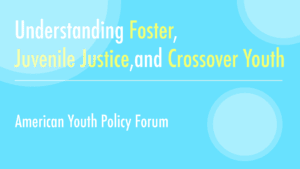Young people involved in the child welfare and/or juvenile justice systems often face significant challenges as they transition to college and career. The Understanding Foster, Juvenile Justice, and Crossover Youth microsite, which draws upon national, state, and local research and data, provides snapshots of the education and workforce outcomes of these populations and explores the challenges they face.
Please click here or on the image above to access the microsite, or peruse the resources below to learn more about this youth population.
Primary AYPF Resources
- Microsite: Understanding Foster, Juvenile Justice, and Crossover Youth
- Graphic: Enhancing Community Supports and Safely Decreasing Congregate Care, Connecticut Department of Child and Family Services Map
- Graphic: Family First Prevention Services Act and Implementation, Virginia Department of Social Services Map
- Video: Child Abuse Prevention Awareness Animated Video
- Policy Brief: Leveraging the Every Student Succeeds Act to Improve Educational Services in Juvenile Justice Facilities
- Policy Brief: Social and Emotional Learning and Traditionally Underserved Populations
- Issue Brief: Supporting Pathways to Long-Term Success for Systems-Involved Youth: Lessons Learned
- Fact Sheet: Education and Workforce Related Policies Affecting Systems-Involved Youth




